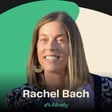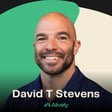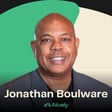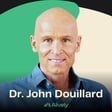Introduction and Metaphor of the Chair
00:00:00
Speaker
Which leg of the chair is most important? Right. You need all of them in order to have a functioning chair. For an individual, there might be a different need, but ultimately all of them are important.
00:00:15
Speaker
Adopt the method that makes you better over time and don't think that this is something that you need to solve this week.
Introduction to the Podcast and Host
00:00:27
Speaker
This is the Home of Health Spam podcast, where we profile health and wellness role models, sharing their stories and the tools, practices, and routines they use to live a lively life.
00:00:40
Speaker
Dr. Dan Pardee, thank you so much for joining us on today's episode of the Homo Healthspan. I am very excited to learn a lot in this episode. I've learned a lot watching your TED Talk and and reading some of the stuff you've put out, but really I feel privileged to be able to have a live conversation with you today.
00:01:00
Speaker
And before we have that live conversation and get into who you are, what you've done, what you're currently doing, how would you describe yourself? I am ah a lively science communicator.
00:01:11
Speaker
Perfect for this episode. Yeah. Yeah. Scientists do experiments. And while I do participate in some of the research that we do on our products,
00:01:22
Speaker
What I realized years ago is that my calling, my interest was taking complex health science information and making it more accessible so that your average person with interest in how to support their health, not nobody with a particular education, let's say in these areas can understand and can hopefully be motivated in the way of doing what feels proportional to the level of knowledge we have, but can then actually act on these ideas so their lives are benefited.
00:01:55
Speaker
That's what that's what gets gets me up every day. And it's a it's an incredible mission to have in life because of how it can benefit others.
The Politicization and Communication of Science
00:02:04
Speaker
I feel like in recent years, science itself has almost been politicized as an idea. And yeah i'm I'm not sure either side's right. So one side, science gets used as this cudgel of, oh, it's science, as if it's this fixed thing Which definitionally, you said scientists do experiment and they say, we're just constantly learning. Here's the best of the science that we know now. And this other said, well, I feel this. It doesn't matter what the research says. And neither is quite true, right? Like it's, it's Bayesian statistics, right? right like We're learning more and getting closer and closer to the truth, but we can't be so certain we're ultimately there.
00:02:40
Speaker
ah So I guess, what are you most excited about these days in terms of communication and the the research you're doing? So you there is a tension between scientific communication and the proper way to communicate scientific studies and our knowledge. So scientists will always lean towards a conservative perspective of let's be careful what with what we think we know.
00:03:07
Speaker
even when we have a mounting amount of evidence. In fact, as a scientist, you are trained to try not to be intoxicated by your own hypotheses. In fact, the scientific method is set up to challenge a hypothesis that you have, right? You're actually trying to prove, you know, you're seeing if you can challenge it to see if it's if it's correct or not.
00:03:28
Speaker
And in the mechanisms by which we do that have then led to What we think is moving the needle in the right direction over time in a lot of different areas that do matter.
00:03:40
Speaker
When you're communicating science, it is ultimately a different animal. You are looking to motivate a person. You're looking to clarify. And what you have to do as somebody with knowledge is take risk.
00:03:57
Speaker
And the risk is saying, this is what, where we think we are now, but we might change, you know, with advancing knowledge, we might prove that we're wrong and have to go in a different direction.
Science, Health Laws, and Evolving Understanding
00:04:10
Speaker
Because if you communicate science like a scientist, and ah ah every single, every single scientific paper always ends with, but more, you know, more research is needed. is needed yeah And it's true, it's true, but that leaves us with very little clarity about, you know, what we can do now. so We have these these two ideas that we have to hold in our minds at the same time.
00:04:32
Speaker
And what I think we should try to then say is, okay, what is the best thing that we can do um with the knowledge we have now? And let's, I love this concept of ah form strong opinions, but hold them loosely.
00:04:46
Speaker
yeah Right? yeah Which means to me that you take the time to try to understand a subject that pretty clearly, but you don't hold onto it as a part of your identity, you then will rapidly and quickly change your perspective when there's new information that shows that there's a a new direction is better.
00:05:05
Speaker
And if you're comfortable with that, then I think then you can help, you can navigate the terrain of of science and knowledge well, because it'll never change, right? We're never going to have like perfect information until something becomes a law.
00:05:19
Speaker
And there are very few health laws, right? There are more laws in physics. ah Somebody many said that unless it's physics, it's not actually a law, right? Like whether it's a speed limit, whatever, it's not actually a law. Like it's not even enforced a hundred percent of the time. So there's nothing that's truly a law if it's not physics. Yeah.
00:05:38
Speaker
Yeah, exactly. Exactly. So you did have a specific question, but went off on a little tangent. Remind me of that. No, that would, it was not a tangent. I think it's really, it's a helpful place to position how we talk about things, especially as we're having this conversation today on some of the latest research where, Hey, we know a lot more than we did 10 years ago or even one year ago.
00:06:02
Speaker
yeah We can't be certain on a lot of this. And yeah there are a lot of things that seem certain and then we find out maybe it was a different mechanism causing it or it has some side effect. We we don't really know.
Role and Advocacy in Health Promotion
00:06:14
Speaker
And so, you know, as a chief medical officer at Qualia, I'd be curious... what you're seeing as the most exciting part of, you know, you talked about that communication of the science to help people be healthier, live better.
00:06:29
Speaker
What is the most exciting research and development that you're seeing these days? Yeah, so, and I'll i'll say, ah I'll make one correction. So I'm the chief health officer, and that is a newer role.
00:06:41
Speaker
ah In fact, it is one that I am advocating for more of in society. You don't see a chief health officer very often. In fact, what you What will often happen, if there is one at all, is they we will find a medical professional to fill that role.
00:06:58
Speaker
And that might not be the right position for that person. Because medicine is really about treating sickness and illness. And so even lifestyle is positioned is positioned as ah prevention, right? So what is the word prevention oriented around?
00:07:15
Speaker
Disease, right? The whole thing comes back to preventing disease. But there are many ways that you can live your life that are not centered around that idea. In fact, when you're younger and you are disease free, and you are decades away from your risks increasing, we need to find different types of techniques to get people to do the things that are healthy for them now,
00:07:36
Speaker
that don't evoke disease at all, that will ultimately have a positive benefit on their disease risk later on. Right. But if you talk to a kid about, you know, peripheral arterial disease, they're going to look at you you know, with glazed over look and and and they won't really care.
00:07:51
Speaker
Well, and yet we have kids that are getting fatty liver disease and everything. Like we have horrible chronic illnesses that are now in our sick population showing up earlier and earlier. So it's true.
00:08:06
Speaker
I'd also be curious when you talk about scientific communication, because at least from Kahneman and Dversky's work, we know people will avoid a loss much more strongly than seek a gain.
Motivating Healthful Behavior in Children and Adults
00:08:16
Speaker
yeah And so... And there is, while health is about living with vitality and vibrancy and all this, the investment people make for that gain may be less and their impetus for change may be less than avoiding something. Then that's a tension with, well, if I'm avoiding something that's decades in the future, I mean, people aren't even good at saving money because they can't plan it for the future, much less, you know.
00:08:40
Speaker
So there's a real tension there. Both of those researchers also discuss something called delayed discounting, which is that the value of a future prospect is discounted heavily the longer you have to wait for it.
00:08:53
Speaker
And so we see this actually, a very interesting model for that is with drug addicts, they heavily ah time discount. Which means that you could ask them a question like, would you like $5 now or $1,000 in a month?
00:09:08
Speaker
But because of the way that drugs will hijack neural circuits, it'll make them take $5 now. They will seek the immediate reward over the one that requires some patients to attain a much, much greater outcome.
00:09:21
Speaker
And so kids actually can be like this too, without fully developed frontal cortexes up and, you know, until they're takes ah up until their mid twenties, uh, in order for those sort of, um executive functions to fully develop.
00:09:34
Speaker
Uh, and we see that also with how modern food can hijack reward systems and have, you know, in a, in a, Kind of like a drug-like effect, which will make you want to for example, have the pleasure of a donut sitting in front of you in right now and discount the value of staying lean or preserving your health later.
00:09:57
Speaker
So those are really the whole behavioral side of health in general fascinates me. And in fact, when I just started of my PhD work, I took the first six months to dissect well-known behavior models and create my own, which I call the loop model to adopt and sustain health behaviors.
00:10:14
Speaker
And the idea is in order for people to pick something new up and then so to adopt it and then sustain it long term, you should they should know why they're doing it, how to do it. If they are doing it and if it's working.
00:10:26
Speaker
And those four buckets you can see are ah mutually reinforcing, but you can't have a person understand if they are doing it on a regular basis just by giving them more information about why it's valuable.
00:10:38
Speaker
You can't and have a person understand if it's working for them just by showing them more ways to do it in their day. All of those parts are mutually exclusive. And if you can fulfill those four buckets, you actually have a greater chance of having that person adopt and sustain those health behaviors long term.
00:10:53
Speaker
But the whole science of this is fascinating. And we could probably do four podcasts on that. But it's a really important part of... what we're trying to do to help
Critique of the Current Health Care System
00:11:03
Speaker
make people healthy. And I'll tell you another tension that I see. We talked about the tension of scientific communication at the journal level and to the public.
00:11:11
Speaker
Another tension is what I see as health promotion and disease avoidance. So the medical system is heavily... invested in the disease side and we need that 100%.
00:11:22
Speaker
one hundred percent But in that model, the operative term there is treatment. So you go an expert and they treat you for the condition that you have. And the hope is that you will do what their hope is that you will do what what they say to then make you better, which oftentimes is one of three different things really. When you go to a doctor, you're getting evaluated for do we need and more information, like another diagnostic, Should this person go to a specialist? So are we going to make a referral?
00:11:49
Speaker
Or you are being evaluated for how appropriate you are for our medication. And all of those things are super valuable. But what has been unsatisfying to the public is that it is far from complete. So our health care system is incomplete.
00:12:04
Speaker
And so we need health promoting side, which is the, when I was saying earlier, the term in the in the sick care side is treatment. You're treated by an expert. The term on this the self-care side is training.
00:12:17
Speaker
What we're trying to do there is to help people understand. uh, take no no knowledge and integrate that. So it becomes a skill through which they not, they then navigate their daily experience, right? You can't treat a person out of a unhealthy lifestyle. They have to learn information and then they have to navigate their day differently.
00:12:38
Speaker
And that takes knowledge. And on that, could I, could I ask? Cause I think there's, there's another point there of on the treatment it's a little bit whack-a-mole in that it's kind of point solution hey this problem so we come in with this and this problem whereas maybe on the the prevention or the the action side there's something more on the gyro science of like it's aging itself it's the the slowing down of the repair or repair not keeping up with what's going on in our body where it may be addressed in a different way and instead of
00:13:12
Speaker
addressing one thing, it's addressing many different systems simultaneously in a positive way. Yes. So this has been a very interesting discussion overall, and it's Is aging a disease?
Aging: Disease or Natural Process?
00:13:27
Speaker
Right? So aging happens because of the body systems become less stable over time. That's one way to look at it. And by the way, there's a lot of different ways that you can look at something. And I love this idea that no model is perfect, but some are useful.
00:13:39
Speaker
So you put an idea out there and hopefully it has some sort of reflection towards what the what's actually happening. But we're using words to then try to describe something that is manifoldly complex.
00:13:51
Speaker
And so, you know, one way to look at then also at health is it is basically this capacity for adaptive variation, while disease is seen as the shrinkage or compression of that capacity.
00:14:06
Speaker
So adaptive variation means that a person can undergo different types of stress and adapt to that without rocking the homeostasis or degrading the ability for the body to fully repair itself and maintain full function.
00:14:19
Speaker
When we get older, the natural aging process, you will undergo something called homeostenosis, which is a decline in the ability of the body to maintain its full form.
00:14:30
Speaker
And we see that. We see the results of it. So the question has then become, is aging a disease? And i don't think that it is um In fact, a lot of times what we're trying to do is retrofit the ideas into the medical system.
00:14:46
Speaker
and how it works. And the reason why people are advocating for health ah aging as a disease is so that we can treat it, right? If it's not a disease and our model is set up to treat disease, then you can't get medications approved.
00:14:58
Speaker
So we're at this crossroads. Yeah. And maybe bill for it, right? More, more than treat it. It's bill for it. Yeah. Get paid for it. Yeah. Yeah. Like doctors really can't do much if you're, you know, you can't get insurance provide approvals. So we have a bit of an outdated system.
00:15:15
Speaker
And that is another major issue is that systems calcify, take very long time. It's like steering a a big, huge cruise ship, right? it's it's It's very hard to, you know, turn that when new information it comes about.
00:15:29
Speaker
We're also at a time where we're generating more information than... and the The pace of innovation is totally outstripping our pace to validate and implement.
Geroscience and Health Span Extension
00:15:38
Speaker
And so all sorts of new medical practice, longevity practices, podcasts, there's all these things now that are advancing human knowledge around these sort these stuff subjects um faster than there are systems to help implement it But, you know, with creative entrepreneurial ventures, we are seeing some cool, uh,
00:15:59
Speaker
advancements, both in ways to understand your health level as you get older, to clinics that are specifically trying to address things that we think age us. And, you know, that is ah whole different science. That that is what geroscience is.
00:16:14
Speaker
So gerontology is the treatment of this medical ah care for older people. Geroscience is a newer field, and that is the scientific method applied to understanding the factors that that are involved with aging and also cause it.
00:16:33
Speaker
So all of these like hallmarks of aging are really proximal near term consequences of the aging process. Probably not what is actually ultimately driving the aging process, but still they offer an opportunity for us to potentially intervene.
00:16:49
Speaker
And if we can, in if we can affect those in a positive way, then we might be able to extend health span, which is maintaining a higher level of health. because health is not a binary term, like you either have it or you don't, extend a higher level of health deeper into the lifespan, even if you don't live longer per se, right? If you're not necessarily affecting but the maximal human lifespan.
00:17:11
Speaker
So that is ah great conversation. But it's also that what's what we're seeing over the last 10, 15 years, right? There is this, it's another tension as we, we're going to use that term.
00:17:24
Speaker
And on that, even if it's not a disease you're treating. Yes. There are actions you can take. There are things you can do or not do, right? Like don't smoke, right? We we know that's going to accelerate aging and cause all these downstream
Philosophical Reflections on Health
00:17:37
Speaker
And then they're now, whatever you think of them, these biological clocks or, you know, function has their biological age. Whoop now has their health span age ah incorporated into the app on certain ones.
00:17:52
Speaker
So what, Are you seeing are the things that are in our control that we can influence this pace of of that aging process, perhaps?
00:18:04
Speaker
I mean, really what i you know, I said earlier that I'm a scientific communicator, but ah i think i um I'm also a scientific, the like a health philosopher. I ponder these types of questions. And so while you'll find more knowledgeable people on all of the different individual subjects that comprise health, I'm trying to think about the bigger picture often in my day.
00:18:26
Speaker
And I'm writing a book on that, in fact. like It's all about what the meaning of health is. And just to go back to one point then about diseases, what are diseases? They're internal states that depress a physiological function below a species-typical level.
00:18:40
Speaker
So if you then are experiencing a reduction in function, but everybody else in your species is at that time of life, is it a disease or is it just the natural part of health decline?
00:18:54
Speaker
And so that's another reason why that can be challenging to define. Would an example of that be like menopause? Menopause not a disease. it's It's a thing that happens biologically at this kind age range. Yeah, exactly.
00:19:07
Speaker
And so healthspan, sorry, um menopause is a natural part of the human life cycle. right Every species has a life cycle and or life history, as evolutionary biologists call it.
00:19:22
Speaker
And that is... that determines all sorts of time-oriented events in the lifespan of ah particular organism. When they undergo sexual maturation, when they are reproducing, the aging process itself. So for example, salmon don't have, they don't age.
00:19:42
Speaker
They will reproduce and then they will die within hours or maybe up to a week, right? We actually have a protracted aging phase of life, kind of like puberty happens at a phase of life. You don't see anybody experience puberty at 60 years old, right? There is a little variability about when it occurs in an individual, but it is approximately at the same time of life, just like menopause is, right?
00:20:09
Speaker
So it is not a disease, although we have sort of had to position it that way, to then have it again retrofit into the medical system so that we can then try to retreat it.
Modern Lifestyles and Evolutionary Health Needs
00:20:20
Speaker
Back to the the question on what disease is and what can cause disease and then the things that are in our control that we can do to shape or influence our pace at experiencing those or even the the pace of aging.
00:20:38
Speaker
There's a couple of ways to look at that. So there, in general, the more that your pattern of living is askew to the origin environmental conditions under which we evolved, then you are going to accelerate the pace of aging because the body is going to be generating more damage and needing more resources to keep up maintaining itself. So you're exhausting your processes faster, right? If you don't get good sleep, if you work ah as a first responder and you have to be up at night multiple times a week, if you're eating a diet that is mostly from the industrial timeframe, so evolutionarily novel,
00:21:19
Speaker
If you are sitting all day at a desk and you're working at a computer, all of these things are built into the modern environment. And we the more that modern technology and the environment changes how we live away from those natural conditions, the faster we will age and the more that we need to figure out solutions that might even involve technology like the use of Quantified self devices to give you feedback about your movement pattern of the day. How much have you moved and when have you moved to try to break up sitting time to make sure that you're getting enough low intensity physical activity.
00:21:54
Speaker
It's like the more that the our lifestyle does change naturally to a new default that feels very normal if we ah if we grew up in that time. then the more that we need to learn and to figure out how to counteract those things.
00:22:07
Speaker
Like a good example that that would be red light, right? Red light is an exciting area. It's called photobiomodulation. We know that red light can penetrate the skin and it can activate energy-creating mitochondria so they can make more energy.
00:22:20
Speaker
So people are using it for hair regrowth and for skin integrity and other in a wound healing, exercise recovery. There's lots of cool areas there. What we're really trying to do is figure out a way to get a environmental stimuli that is involved in our health. It's one of the determinants of our health, which is red light.
00:22:40
Speaker
ah even though we're indoors for 93% of our day, right? Where we evolved in a on a planet, we were outside during the day, so we got a lot of sun exposure, the natural source of where we would get our red light.
00:22:53
Speaker
That's a great example because now there are red light devices that are just trying to help us fulfill that that actual need, and they seem quite technological, but it's just another solution to try to figure out how to get the stimuli that we're missing.
Determinants of Health and Lifestyle Balancing
00:23:07
Speaker
So overall, the answer, I think, is what are all the determinants of health? What are all the different things things that are affecting our health? And it's more than we realize, right? I talked about gravity in my TED talk, right, as an unfluckrating part of the conditions under which we evolved.
00:23:24
Speaker
But when we put a person, and a human body, in a gravity-free environment in space, guess what happens to their health? Right? It goes south quick. It goes south quick because the body's not familiar to that. So we don't think of gravity as an important part of our health because we don't have to think about it. You take it for granted. Yeah.
00:23:43
Speaker
Take it for granted. Does it matter? Absolutely. And so as we've been able to change our lighting environment, then we've had to figure out ways to sort of counteract that. Have we been able to change our food environment and how the forces, the pressures I call them of modern life,
00:23:58
Speaker
change how we, you know, our physical body is moving throughout the day. All of those things, the farther askew they are from those natural conditions, the faster it will age us.
00:24:09
Speaker
But you can live a modern lifestyle and still be very healthy. So it's a, it is a you know, I have optimism around this, but we we don't treat it with as much respect as it's needed, as needed.
00:24:22
Speaker
It's sort of like, oh yeah, let's just give you a couple of tips here and there. Like we, like as if everybody knows all of these things already and we just, they just need reminders. At some point we need reminders when we've learned, but we are dramatically missing an opportunity to train people to be how, on how to be healthy in today's world.
00:24:41
Speaker
You know, so kudos to everybody who's listening today. Good for you for, for listening, for paying attention, for doing things that help to take care of your health. But without that effort, We see the consequences of a very sick society that most of whom are just not getting the right amount of of training and knowledge to take care of themselves. but And it can seem at times that people don't care. And what I think is that it can feel really overwhelming and we don't have the right systems in place.
00:25:08
Speaker
But I do think that people do care. it is a part of you know who we are as ah as a human to want to take care of ourselves. right That is a part of our survival instinct. And I mean, on the knowledge part, you Tim Ferriss always has this line of if all it took was knowledge, everybody would be a billionaire with six pack apps. And so it it gets back to that behavioral change and that loop that you mentioned before and the being overwhelmed, right? Like if you get hit with a hundred different things, it's the same as getting hit with zeros because you get overwhelmed.
00:25:39
Speaker
We know was a study that they had 24 kinds of jam versus six and you were 10 times more likely to buy when there were only six, right? Once you kind of hit a tipping point, it was way too much choice.
00:25:50
Speaker
So understanding there are all sorts of things out there you could
Personal Motivators and Long-term Health Improvement
00:25:55
Speaker
do. Like we just talked about red light there. I got my Mimito red light back there, right there. nice But that's probably not the place to start, right? Like if you're going to pick one thing, and like, Hey, let me start the pebble rolling. Let me get the snowball going. Cause I can compound over time.
00:26:10
Speaker
what would be for people to find the fit for them? Like three different ones. You're like, Hey, this I've seen really work for people's first step as they're trying to pursue health not treat sickness or not even avoid sickness, but truly pursue health?
00:26:28
Speaker
Yeah. it's ah It's a really fun question to address. and the analogy that I've given before is when people say, well, you know, all right, what's most important?
00:26:38
Speaker
And I say, okay, which leg of the chair is most important, right? And you need all of them in order to have a functioning chair.
00:26:52
Speaker
Now, on an individual basis, let's say your left front side is a little wobbly or weak and my back, ah you know, left side has a crack in the middle of It's going to fall over.
00:27:03
Speaker
For an individual, if there is, there might be a different need, but ultimately all of them are important. And so the way that I think about it is instead of kind of honing in on, because I could, I could say, you know, exercise that has, it seemingly has an outsized effect on our health. And you could make a good argument for that, but that exercise is, and movement is one of the most consequential lifestyle components for health. Sure.
00:27:32
Speaker
Rather, what I say is adopt the method that makes you better over time and don't think that this is something that you need to solve this week. You have a lifetime left to exploit the knowledge you do gain for your benefit.
00:27:50
Speaker
So every time you have an opportunity to learn one new thing that's helpful, you have now a new opportunity to benefit from that for decades. Right. So it's a slow process. There isn't a finish line with health. It's not as though you take a course and then you're done.
00:28:08
Speaker
It is a health is a process goal. And that part of that process is always staying connected to the information. So even if this is not your specialty, you know, you're a lawyer, you're a teacher, whatever you're doing.
00:28:20
Speaker
stay connected to health information and keep practicing, keep trying, try new things, work on your sleep for a period of time. There might be things in your life that make you want to focus on one of those determinants more now than previously because let's say you're not
Developing Personalized Health Practices
00:28:38
Speaker
Great. It's an opportunity for you to learn more about sleep, the factors that actually affect it and drive good sleep, and then see how you can... create your own sleep practice.
00:28:49
Speaker
So everybody is beholden to create their own health practice and you get a lifetime to work at it. So think of that as the right process.
00:29:01
Speaker
And then i think where you start might be more, you know, it could be different for you and your listening, different listeners. I'm having gut problems. Okay. How do I learn how to take care of my gut? Okay.
00:29:13
Speaker
I'm super sedentary. I have more body fatness that I care to have. And I want to see if I can work on that. There's all sorts of motivational sources that an individual will have.
00:29:25
Speaker
Um, but we're also very different people at different times of life and what motivates us at a different phase of life is not the same. so we were talking a little bit about this earlier.
00:29:36
Speaker
When you're a kid, if you can tether aspects of health to things that people care about now, then you are you have an advantage.
00:29:48
Speaker
What's cool about this newer concept of health span is that a lot of people... in middle age do care about it once they start to see their peak level of health decline. And now it becomes, there's a little bit more urgency to, okay, how do I sustain a higher level of health as I age?
00:30:05
Speaker
And I'm really happy to see that. I'm really happy to see that. And as I've seen it land better with younger people, it's building more body awareness and energy awareness.
00:30:16
Speaker
So, you know, you go eat junk, you eat a sweet roll, whatever. And then you don't necessarily make the association as an eight-year-old, as a nine-year-old that man, I'm super cranky 45 minutes later, everything seems bad.
00:30:28
Speaker
But if you keep calling the attention, hey, hey remember we ate this and like how fun it was in the day we had. And remember each time you have this, what it feels like after. And then just building that awareness. I've seen children steer themselves to...
00:30:42
Speaker
Oh, yeah. Like, let's go play outside. I don't want to sit on the screen because I find I'm in a terrible mood the rest of the day. I want to go to the beach. I want to go do this other stuff. ah Just building that awareness, which as an adult, I'm not always great at myself, but it's trying to help the younger people, too.
00:30:58
Speaker
Totally. So a population that I'm very motivated to work with and haven't really as much yet is younger people. Because the way that we currently address health and kids is let them form an unhealthy relationship with the world, given whatever pressures and conditions they are growing up in like new so screens and video game addiction and all that.
00:31:21
Speaker
And then we're going to try to change that relationship once it's solidified but it's baked into their way of being yeah yeah now you can do that but that is clearly not the best way to go about it the better way to go to go about it is to dedicate a much more significant amount of time to health not just as a subject like an academic subject la the comment that tim ferris made but it but also the development of health as a personal skill
00:31:53
Speaker
Knowledge is important because it's very difficult to maintain an activity that is disadvantaged in terms of it how much reward it offers. but when you don't know why you're doing it, like you might try it if it, be if it sort of reach, reaches a popular zeitgeist of like, Oh, all these people are trying fasting. I want to try it because it's hot right now, but it's hard to sustain something unless you understand why you're doing it.
00:32:18
Speaker
And to go back to that model that i introduced earlier, it it's it flows really nicely to say, why should you do it? How do you do it? Are you doing it? Is it working? But the reality is that people can enter into that,
00:32:30
Speaker
model, if you will, from all different directions. You might just start trying something first and learning how to do it. And then you want to know a little bit more about why it's good, right? Or you get a Fitbit and you're tracking your steps and then you want to learn more about why it's good. Or you get a blood test and you learn things about what's happening inside of you.
00:32:48
Speaker
And then that kicks off the cycle of figuring out ways to improve those markers. And so we i describe that model in that way. The reality is, is people can enter in from all different sides of it.
Behavior Models and Teaching Frameworks
00:33:02
Speaker
And that's okay. You know, behavior models will describe, predict, or explain why behavior changes, but they can also serve as a model to try to create behavior change. I like this model as a way to sort of Think about how are we going to try to affect behavior change? Well, we want to actually create some activity across all four of those domains.
00:33:23
Speaker
It makes sense. Yeah. it Make it self-perpetuating and reinforcing. Yeah. Yeah. and And I'll say this too. um I think we get lost in the details. It's easy to do that. So, the way that I like to learn to teach is almost like i have this vision of this cone, right? So, imagine you're at the very top of the cone and as you're moving around it, it gets deeper and deeper and deeper.
00:33:47
Speaker
So, when you are teaching something, how do you teach it in a way where you develop and and and a framework that then layers in more details as you have some semblance of what that idea is.
00:34:01
Speaker
We oftentimes start with hyper detail and then we're trying to figure out the shape of the animal along the way. We never do. And so you have all these, what I call disembodied facts that don't have no scaffolding upon which they can hang.
00:34:13
Speaker
And so what it leads to is the sense of frustration of like, oh my gosh, I'm just completely overwhelmed. There's so much information and I'll never got on top of it all. And I think we can learn in a better way, right? Teach the principles On that with the the information, it was a question I meant to ask earlier with kind of staying on top of information as
Timeless Health Principles
00:34:34
Speaker
it changes. And this question of, are there certain...
00:34:38
Speaker
understand we can't be certain of everything but or anything, but that we're pretty sure like getting ah good seven and a half to eight hour hours of sleep, like you're going to be better off for that, right? Like yeah you're not going to get new research. Like actually it's two and a half hours a day. And if you sleep seven and a half, year' you're poisoning your body, right? So we can be pretty sure...
00:34:59
Speaker
in that on moving your body, we're gonna be pretty sure, hey, moving more versus being sedentary more, moving more is better. There are studies that seem to pop up were like, oh, marathon runners because of calcification or something, like they may actually not live as long. And so, ooh, I don't know, do I stay on top of this?
00:35:15
Speaker
And then there's one realm that seems like every week is a new study. Eggs are bad, eggs are good, butter's bad. Like nutrition's just, oh my God, it's a minefield. So for someone who,
00:35:27
Speaker
is a teacher, is a lawyer, is say hey, I care about this, but look, I have a family, i have a job, I have to get through my day-to-day, I can't go read all the latest research. Are there certain things you can say, look, these are truly no regrets moves, you're not going to have to stay on top of everything.
00:35:44
Speaker
i mean, is it is it like we think about things in the five pillars, fitness, nutrition, sleep and recovery, stress management, and your social connection. And are there kind of no regrets moves in those buckets? you can say, hey, even if you can't stay on top of the latest of, you know, repomycin is good, repomycin is bad, like whatever it is, these you can be pretty sure on and and move forward with.
00:36:06
Speaker
Yeah. I mean, if we think about, so science is always debating on pushing the boundaries to expand our knowledge on what we know. So there is an outsized emphasis on the novelty of what's happening in the moment.
00:36:22
Speaker
And what we do is it makes us sometimes major in the minors, to borrow a saying from my friend, Dr. Tommy Wood. And so what that what that means is that we are not necessarily proportioning our efforts based off of what has the most evidence for biggest impact, but trying out what's new, almost as though if we're finding subconsciously or aiming to find a silver bullet that will help have explained a lot or create extraordinary transformation.
00:36:51
Speaker
The extraordinary transformation actually comes through the the application of what I call the mundane but meaningful, you know, consistently walking your 10,000 steps, not for a period of time, but as a new pattern that characterizes how you traverse the world over years and decades, right?
00:37:13
Speaker
I'm so such a fan of quantified self technologies like Fitbits, et cetera, or a rings, because they can give you some insight and really more than information that they give you back.
Technology's Role in Health Improvement
00:37:25
Speaker
The value is if you use them as a performance enhancing device, like they only really help you be healthier if you attend to the information and and if you let those devices and the data shape how you live. Right. If you look at your steps and you're at 2000 steps and you're like, ah whatever, whatever.
00:37:41
Speaker
It's not helpful if you look at them and say, all right, well, I don't have as many steps as I'd like today, but I'm going to actually use the information to get a little bit more. I'm going to make sure I do that walk after dinner. going to take this next call pacing around my office.
00:37:54
Speaker
Right. Use the use the information to then actually push you allow it, give it permission to help nudge you in the right direction. I've seen way too many people look at it and say, yeah, yeah, you know, it didn't really help.
00:38:10
Speaker
and ah And I think, well, it could, but you have to let it, right? you have a clear goal and do you have ways, are you trying to figure out and solve ways in your life, right, that we are all incumbent, it's incumbent upon all of us to try to figure that out because we're all living a little bit of a different life, right?
00:38:29
Speaker
Where are your opportunities to get those next 500 steps, if you are using that analogy? yeah So yeah, so, you know, kind of synthesizing, we have a lifetime to learn good information, think in principles versus all the data, what the principles that you can try to extract?
00:38:49
Speaker
And then how can you monitor the flow of information to remind you of all this information. So it's like that that is the constant nudge to do that thing that you kind of had forgotten about.
00:39:00
Speaker
Like get out in nature. Walking in nature is probably better than walking on the treadmill. Don't let it not let you walk on a treadmill, but see if this weekend you can plan a hike in the woods with your family.
00:39:11
Speaker
You have to try to like, Think about what can I do in response to this flow of information that reminds me to do something that either educates me on something new or reminds me to do something that I've heard before that is going to be healthy.
Introduction to Qualia Products
00:39:25
Speaker
Back to not majoring in the minors, to your point, and they're the big majors to do, but there are minor things that we can also do. And I know as chief health us officer of Qualia, you all create some products. And I know there's a a discount code that you're offering. We'll include in the show notes.
00:39:43
Speaker
But do you want to touch on how those could be helpful to to people? Yeah. you know So I started working at the company probably three months ago. I've wanted to get into the product space for a long time because I see great value in it.
00:39:57
Speaker
You can embed a lot of knowledge into a very easy to consume, to implement form factor. So there's a great deal of good you can do. And there's a market for it. People love supplements. I mean, people there are different archetypes of supplement consumers.
00:40:14
Speaker
There are those who say, just, I will only do what I have to. Like, if I have to take vitamin D, then I'm going to do that. And on the other pole, you have what I call pioneers or explorers and they want to try Brian Johnson.
00:40:29
Speaker
Yeah. Yeah. Like what, Hey, I'm enamored by this and I want to try and experiment and explore, but The reason I really was gravitated towards this company, because I've known them since the beginning and I've been friends with the company, is that they ah create formulas that are trying to support the natural process of the system.
00:40:50
Speaker
So the first product that we had was Qualia Mind. And that is a nootropic, which is a cognitive answer that is good for the brain. And you can also have cognitive enhancers that will help elevate some aspect of cognition that aren't good for the brain over time.
00:41:11
Speaker
So the best of both worlds is that they help you perform better now, today, health performance, but they also will then keep your brain healthier. And with this product, I have absolutely, it's sort of I was sold by my experience in a way, but we've definitely gotten into health span.
00:41:29
Speaker
And so we are looking at the opportunities to apply the same methodology. to addressing these hallmarks of aging in a way that helps extend the level of health longer.
00:41:43
Speaker
And it's an exciting field. And I'll say this, there will not be one supplement that does it all, but rather there are ways to sort of address one system. And then the interesting question becomes, how do you sequence those in some sort of monthly protocol, weekly protocol that helps you uh, have a greater level of efficacy together. It's either additive or synergistic, but these are things that can, along with lifestyle, we think there is an opportunity to extend the level of health longer. It's exciting.
00:42:15
Speaker
It's very exciting space. And, you know, as, as I continue to develop, hopefully we can have you again on the show at some point in the future. I would love that. Yeah. it's It's been great to to chat. I love all these questions or, uh, these ideas. It's fun to chat with you about them.
00:42:30
Speaker
Yeah, and it's clear you are a scientific communicator. So I know our listeners are appreciative of you taking the time today. And I know i personally am. So thank you, Dr. Pardee. And anyone listening, I hope you enjoy a lively day.
00:42:43
Speaker
Thanks so much for having me on. Thank you for joining us on today's episode of the Home of Healthspan podcast. And remember, you can always find the products, practices, and routines mentioned by today's guests, as well as many other healthspan role models on alively.com.
00:42:57
Speaker
Enjoy a lively day.

















